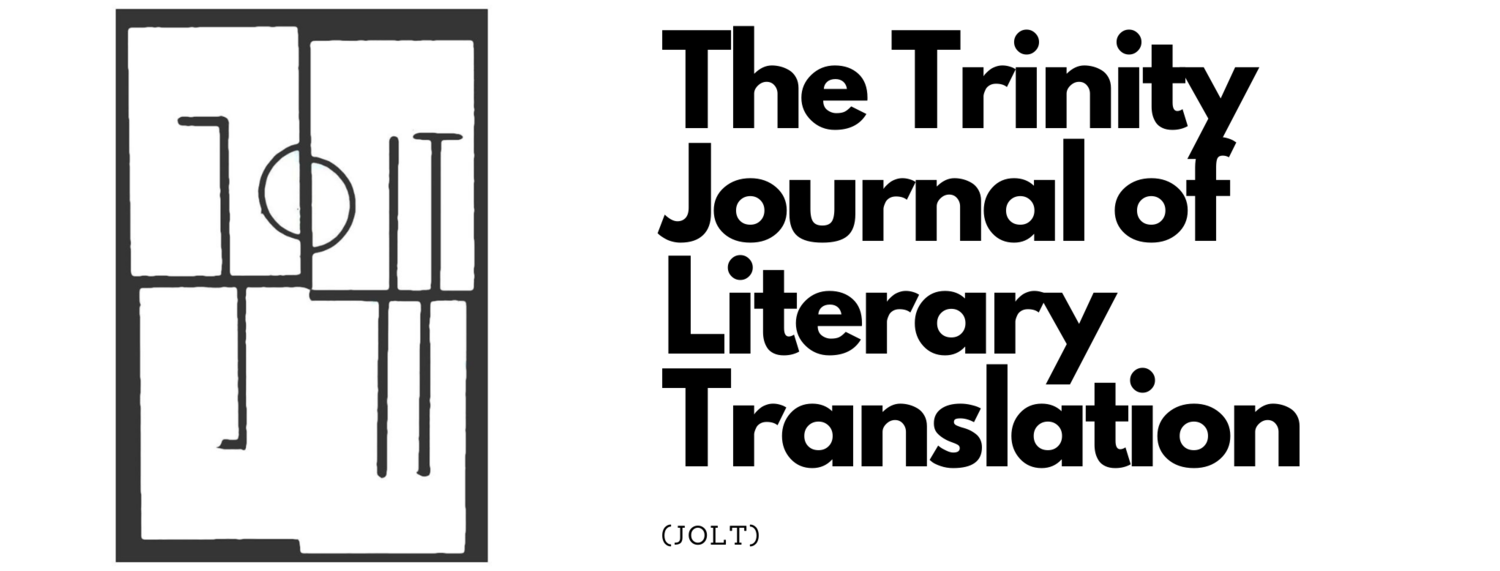JoLT is currently accepting submissions
Please see below for submission guidelines for Vol. 14, Term Issue II on the theme of DEVOTION.
Submission Guidelines
All submissions must be made via email to trinityjolt@gmail.com before 12 midday on Monday, March 9th, 2026. Late submissions will not be entertained.
Submissions must have some relation to the prescribed editorial theme, either explicitly or implicitly. This issue’s theme is DEVOTION. Submissions that are judged to be not even loosely related to the theme will not be accepted.
We accept electronic submissions in Google Doc format ONLY. Submissions in PDF or other formats will NOT be accepted.
Contributors must submit the source text in its source language along with their own translation. As per the journal’s name, your chosen source must be literary, however we are open to exceptions as long as literary elements are still present.
Prose submissions must be under 1000 words in length. We are open to exceptions but please be aware that the journal’s layout allows very little space for longer extracts to be published. Please note that this word count refers to the translation itself, not the source text and the translation together.
Poetry submissions must be under 100 lines long. We are open to exceptions but please be aware that the journal’s layout allows very little space for longer extracts to be published. This word count refers to the translation itself, not the source text and the translation together.
We accept extracts from longer works.
We accept translations from/into any language however, either the source text or the translation must be in English or Irish. You are free to translate a text originally written in English into Irish if you wish.
Your translation must be original, your own personal work of translation. Plagiarism or translations done through Google Translate, AI and other tools will not be tolerated and each translation will be individually checked for these purposes. Following from this, we cannot accept translations that have already been published or featured anywhere else.
We also accept short pieces of literary criticism related to translation at the behest of the editor.
You are welcome to send more than one submission if you so wish.
The Trinity Journal of Literary Translation is first and foremost a publication of Trinity College Dublin, and therefore priority is generally given to submissions from Trinity students, staff and alumni. However, we do encourage submissions from external contributors which will also be considered for publication. The final decision on what pieces are included in the published issues is an editorial one.
As is always the case, it is not possible to include everyone’s work, regardless of its standard. This is particularly true as we work within the confines of layout and spacing as allowed by our student budget. We are also not in a position to provide in-depth feedback on those submissions not selected for publication. The final decision on what pieces are included in the published issue is an editorial one.
What do we mean by DEVOTION?
With the theme of DEVOTION, we encourage translations of literary works that explore deep-rooted love, loyalty, commitment, and sacrifice — emotions that hold the power both nourish and consume, whether we speak of devotion to a person, an ideal, or a craft.
Mary Oliver writes that “attention is the beginning of devotion” — you may wish to consider what the roots of devotion are: careful observation, selflessness, contemplation. What allows us to devote ourselves to anything at all? How does devotion tie into the ethics of compassion and care?
Devotion is often used synonymously to piety and worship in religious contexts. You may therefore choose to explore devotional literature or works that grapple with our relationship to the divine.
As always, the theme is intended as an open question and we are eager to read your creative interpretations of it!
In your submission, please include:
your own name, and the name of the author of the source text.
the titles of the source text and translated text.
a copy of the source text.
a short (less than 50-word) introduction to the piece translated, outlining the relation of your translation to the prescribed editorial theme (DEVOTION).
a short (less than 50-word) translator bio, written in the third person.
*if possible, please provide the bibliographic details of the source from which you have taken your original text (name of author, title of the work, edition, place of publication, publishing house, year of publication). If the original text has been taken from an online source, please provide the website details and/or a URL link.*
All submissions must be made via email to trinityjolt@gmail.com before 12 midday on Monday, March 9th, 2026. Late submissions will not be entertained.
All submissions must comply with the guidelines outlined above.
In case of further doubts, questions or clarifications, please direct your queries to our email or send us a message via our contact form.
AS Gaeilge
Tá Journal of Literary Translation Choláiste na Tríonóide ag glacadh le hábhar anois d’Imleabhar 14, eagrán téarma I. Is é DÚTHRACHT téama an fhoilseacháin seo. Glactar le haistriúcháin próis agus filíochta a bhaineann leis an téama. Glactar le haistriúcháin ó theanga ar bith go Béarla/ Gaeilge (agus a mhalairt). Le bhur dtoil, léigí na treoirlínte roimh aistriúcháin a chur isteach. Seolaigí bhur n-aistriúcháin chuig trinityjolt@gmail.com roimh 12pm ar an Dé Luain, 9 Márta 2026. Má tá ceisteanna agaibh, seolaigí DM nó ríomhphost chugainn.
Original Art Included in Vol. 11, Issue 1, Naemi Dehde - Dream 2

